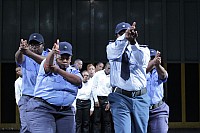 Comfort and Hope
Comfort and Hope
Matthias Hasse
Comfort Ye depicts a day in the life of one of South Africa’s countless “previously disadvantaged communities”, more commonly known as townships or informal settlements. The narrative draws together stories written by young members of the Bloekombos Secondary School choir.
Their narratives tell of love, loss, pursuit, murder, abuse, families torn apart. These are, sadly, not unusual stories in their community. They pose the question: In times of despair, where can you find hope? International music organisation Umculo became aware of these stories in the course of a four-year collaboration with the choir, and conceived the idea of creating a work of music theatre around them. In part, the goal was to reflect reality, to confront audiences through a new, strong performance piece. But the aim was also to give the young people the chance to express themselves, to sing and act their own stories as a way of coming to terms with their experiences, and to help them move towards a better future.
The choir of Bloekombos Secondary School was founded by conductor Siyabulela Sulelo in 2009, and has won many awards. Its members are the main protagonists of this performance, which is the result of an intensive 18-month creation process.
Robert Lehmeier is responsible for libretto, concept and stage direction, while the Berlin-based Australian composer Catherine Milliken, who was also lead the associated educational work, wrote some of the music. Umculo is the initiative of Shirley Apthorp, a music journalist with roots in South Africa who lives in Germany.
What results is a form of collage with texts set to music by Milliken, tunes composed by the young people themselves, extracts from Handel’s Messiah and from his oratorio L’Allegro, il pensieroso ed il moderato – all of it performed by the choir, four vocal soloists, two actors and an instrumental ensemble.
It is six in the morning. In the township, a gunshot shatters the pre-dawn stillness. As they rise to face the new day, the chorus sings the traditional “Nkosiyam” with impressive resolve.
The authenticity of this work, in particular through the young participants, is breathtaking. They sing and act their own stories – and how. They move with complete assurance on the stage, they perform at an astonishingly high level of excellence, and at every moment you can feel their joy both in performance. They are also utterly convincing as a chorus, whether they are singing the gently swinging “Everything’s gonna be all right”, the demanding “Night Chorus” by Milliken, or Handel’s sombre “Thy pleasures, moderation, give.”
Lehmeier’s staging is engrossing. Without any cheap showmanship, he creates scenes of tremendous poignancy, like the “Darkness” scene. Above all, he succeeds in building a bridge from the traditional “Nkosiyam” to “Comfort Ye”, the first tenor aria from Handel’s Messiah. Handel’s music is brought into an entirely new context; suddenly, his music sounds as if it could have been written yesterday, and the baroque era feels far less distant. The first bars of “Comfort Ye”, and the words which tenor Rheinald Tshepo Moagi infuses with considerable feeling are intensely moving. “Nkosiyam” is layered above the aria, and both melt into a happy and appropriate symbiosis. This is the real message of the evening.
Milliken has set to music texts collated from the young people’s writing by Lehmeier. She succeeds in creating some truly great moments, like the reflective soprano aria “Things aren’t easy” or the mezzo’s catchy “Being a mother’s not an easy thing.” Her music creates broad atmospheric surfaces and incorporates driving rhythmic elements which especially suit the choir members, with the physicality they bring to performance. The arias work in the baroque sense as reflective moments which mirror the affect of a given moment in the action.
Lighting designer Michael Maxwell illuminates the stage most vividly, from poetic economy in the “Darkness” scene to the icy beam of the spotlight in the implied rape scene.
Alongside the choir, soprano Siyasanga Mbuyaze, mezzo Bongiwe Nakani, tenor Rheinaldt Tshepo Moagi and baritone Njabulo Sifiso Mthimkhulu all deliver strong performances. Mbuyazi’s vocal potential unfolds in Milliken’s aria “Things aren’t easy” and in the ensemble scenes, Nakani, as the alcoholic mother, gives a convincing account of the aria “He was despised” and is equally strong in Milliken’s jazz-like “Being a mother’s not an easy thing”. Hers is a large yet flexible voice, easily mastering Handel’s coloratura, while her performance as a drinker battling her own inner desperation is utterly convincing.
Moagi’s big moment comes at the end, when he returns to Handel’s “Comfort Ye”. His dramatic power onstage is consistently strong. Mthimkhulu’s dark, full voice conveys an extraordinary sense of peace in his aria “The people that walked in darkness.”
The performance is accompanied by a small instrumental ensemble under the direction of Erik Dippenaar, an organist and harpsichordist who has specialised in early music and returned to South Africa after some years based in London. The group’s stylistic flexibility is impressive, and they prove reliable, inspired support for the soloists and choir.
Xolisa Kapakati plays the role of a persecuted outsider with conviction. But the evening’s greatest discovery is perhaps 19-year-old Nicholate Ngongoshe. She plays a young girl, also an outsider, made pregnant against her will, with such intensity, such communicative expressivity, that the audience is reduced to tears on more than one occasion. She has the evening’s last words: “It is God’s plan for me to live like this, but I can’t deny that it is hectic. It’s about… love.” With a piercing scream she bears her child, the outcome of a rape, and brings new hope, a new life.
The 90-minute work was received with tumultuous at all three sold-out performances. It is to be hoped that the production will have a life beyond this first Cape Town run.